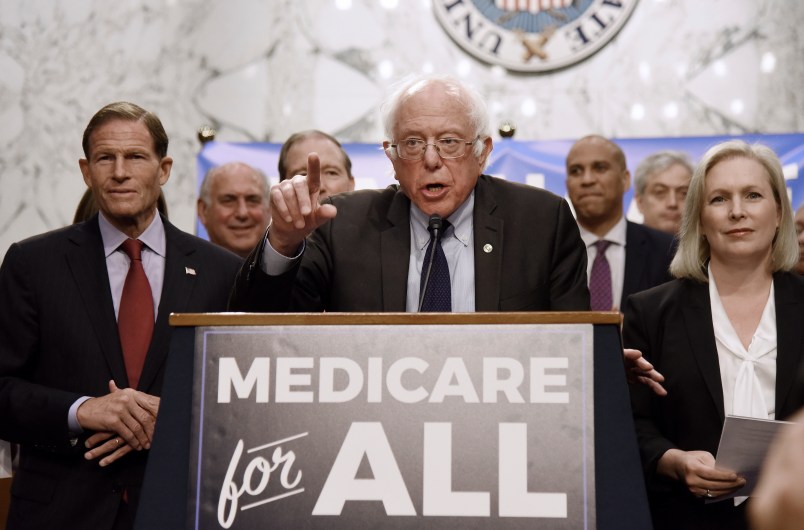When Sen. Bernie Sanders (I-VT) last introduced a single payer health care bill, in 2013, not a single senator came on board. When he introduced one on Wednesday, it had 16 Democratic co-sponsors—including many of the party’s rising stars who are weighing future presidential runs.
“I am very excited about the support the bill is getting both across the country and right here in the U.S. Senate,” enthused Sanders, flanked by several of his fellow lawmakers. “Health care must be a right, not a privilege. Today we begin a long and difficult struggle.”
Though the bill introduced this week has no chance of passing in a Republican-controlled Congress, and is more of a blueprint than a fully fleshed-out plan, the proposal and its reception show just how far the party’s base has moved to the left on health care in just a few years.
In introducing the legislation on Wednesday during a Capitol Hill press conference, Sanders lamented that the U.S. health care system is “woefully behind every other major country.” He called for a four-year transition to a fully public model that would cover hospital visits, primary care, lab services, maternity care, most prescription drugs, and vision and dental care—without any co-pays.
Though the bill does not say how the government would pay for the implementation of universal health care, Sanders released a list of populist suggestions, including raising the estate and capital gains taxes, creating a new tax on the wealthiest 0.1 percent of earners, and taxing Wall Street banks and other large financial institutions.
Sander promised Wednesday that any increase in individual taxes would be “more than offset” by the health care spending savings people would enjoy.
This lack of detail did not bother co-sponsors like Sen. Richard Blumenthal (D-CT), who told reporters that the message of the bill is what’s important.
“There should be no question about what our goal is, which is to provide access to everyone,” he said. “It’s an idea whose time has come. We’ve been very cautious and careful and the Affordable Care Act has served many Americans well. In no way are we scrapping it. We’re building on it. This is the next step to build on the ACA.”
Sen. Al Franken (D-MN) agreed, describing the plan as a “starting point” and calling it “aspirational.”
Even more centrists Democrats who don’t support the Medicare-for-all plan have moved to the left as well, and several are calling for some kind of an expanded public option.
“I think it’s great we’re discussing it,” Sen. Claire McCaskill (D-MO) told reporters, “and I certainly think we should allow people between 55 and 65 to buy into Medicare, but I think that [Sanders’] particular proposal is premature.”
Other Democrats, including House Minority Leader Nancy Pelosi (D-CA), have cautioned against kicking off an uphill battle for single-payer while there is still an active effort by Republicans to repeal the Affordable Care Act.
A poll conducted by the Pew Research Center found that a narrow majority of Democrats now believe in a single payer system, a jump of nearly 20 points since 2014.







Let’s see where this goes
We won’t have to look very far.
At least this is a good step in the right direction and will shine a light on the biggest no brainer ever.
One large risk pool that covers everyone? Lower costs? Run by Medicare, one of the most efficient healthcare systems in the world? Cut out the middleman insurance companies that make massive profits and try to screw their customers at every turn?
Hmm…Seems to check all the boxes.
Let’s see if they can sell it better than they have in the past. I’ll flip my shit if I see one more person completely drop the ball when a reporter asks “well it couldn’t pass at the state level in Vermont, why would it work for the U.S.?”
Medicare-for-all is a good rallying cry, for sure, but it’s probably not the best way forward.
Medicare for all at age 45? That’s a better system, using the private sector for those pre-45 (employer/individual) where the costs of providing health care are generally on the lower end of the spectrum.
As for funding? The pre-Medicare coverage is paid for now (employer/individual), so there’s some funds to start with. And you’re eliminating a massive amount of overhead.
Short answer: This is not too tall a mountain to climb.
I think Sanders has provided Democrats a good marketing theme and an aspirational target that can appeal to a number of voters. Single Payer/m4a is a bad idea from a policy implementation/cost standpoint, but it has good branding.
I sensed Sanders recognized the price tag problem in his remarks and seemed to open the door to medicare buy in or public option as an interim measure. If what we end up doing is campaigning on m4a and pass medi buy in when we win bad Congress, I’m all for it. If he insists on sabotaging and scapegoating those who would push for Medi buy in or public option, then I think this effort will damage the party. I’m an optimist and I’ll choose the former.